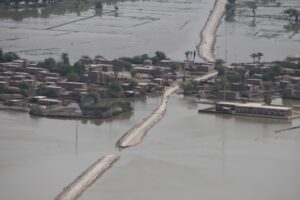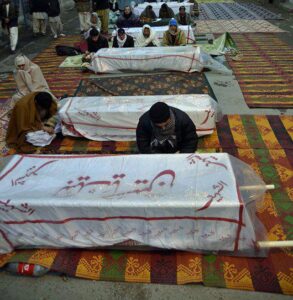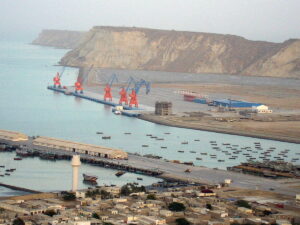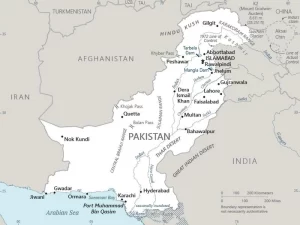Pakistan
Where
Pakistan, a country in the Middle East, is bordered by Afghanistan, China, India, Iran, and the Arabian Sea.
Balochistan is the largest but least populous of Pakistan’s four provinces.[1] It has strategic access to the port city of Gwadar and is rich in natural resources. Pakistan’s other provinces profit from these resources, while Balochistan remains deeply impoverished. Areas within the region lack clean water and reliable electricity.[2] Economic inequality between provinces has fostered resentment and polarization. Terrorist organizations operate in this region because instability and marginalization make it easier to gain control.[3]
What
In 1947, leader of the Muslim League Muhammad Ali Jinnah called for a separate Muslim state to be created in the process of Indian independence. British India was subsequently partitioned, creating West Pakistan (today’s Pakistan), India, which has a largely Hindu population, and East Pakistan (today’s Bangladesh).[4] Pakistan’s first decade was marked by many leadership changes which resulted in political instability and military intervention as a form of politics

Floods in 2010 devastated entire communities in Pakistan. Image courtesy of United States Marine Corps is in the public domain.
In West Pakistan, now referred to as Pakistan, General Perves Musharraf took over in a military coup in 1999. [6]
The Pakistan People’s Party and the Pakistan Muslim League-Nawaz created a power- sharing agreement in 2008, implementing a democratic form of governance.[7] Despite this step towards democracy, economic and infrastructure issues raised concerns that this transition period might collapse. From 2008 to 2010, more than 3 million people became internally displaced due to flooding that affected 20 million people, internal political and economic conflict, and a Pakistani army operation conducted against terrorist organizations.[9]
Despite concern that these events might endanger democracy in Pakistan, the 18th Amendment to the Constitution, passed in 2010, enshrined democratic systems.[11]
What
The Baloch
The Baloch are an ethnic group representing less than 4% of Pakistan’s population, but 52% of the population in Balochistan. They have sought to establish an independent state since the inception of independent Pakistan in 1947. Radical groups lead an armed insurgency against the government, yet most Baloch citizens are not active in the fighting. Many are peaceful advocates for greater autonomy within the Pakistani constitution.
The Pakistani government and military have repressed Baloch citizens since the early 2000s. Security forces persecute not only insurgents, but also Baloch leaders, human rights groups, journalists, activists, and civilians through enforced disappearance, torture, and extra-judicial killings. The Pakistani Commission of Inquiry on Enforced Disappearances reported 5,000 enforced disappearances in Balochistan from 2014-2019. Local human rights groups say the number is up to 20,000 enforced disappearances, 2,500 of whom have been found dead.
Baloch militants have also committed grave crimes, including attacks on ethnic Punjabi civilians. However, the violence remains highly asymmetrical.
Why
Pakistan’s Muslim majority is split between two sects with different interpretations of Islam: Sunnis (85-90% of the population) and Shias (10-15% of the population).[12] Sunni terrorist groups have threatened and attacked the minority Shias since the 1980s. [13] Pakistani Shias face hate speech and extremists led anti-Shia rallies inciting violence against Shia as ‘infidels.’ [14]

Hazaras mourning for the loss of their deceased loved ones in Quetta, Pakistan. Image courtesy of Ashrafghaffari is cropped and licensed under CC BY-SA 3.0.
Hazaras are an ethnic minority within the Shia sect. Since the early 2000s, Hazaras have faced hundreds of deadly attacks by Sunni militants in Pakistan.[15] Hazaras’ religious affiliation, small ethnic community, and facial features, said to resemble those of people from Mongolia, make them uniquely vulnerable.[16] The Taliban terrorist organization, Tehreek-e-Taliban Pakistan, has also exported radical anti-Hazara sentiments to Pakistan through close ties with Pakistani terrorist groups.
Almost 500,000 Pakistani Hazaras live in Quetta, Balochistan’s capital city. The enclaves that most Hazaras live in are guarded with high walls, barbed wire, military personnel, and security checkpoints. Hazaras are safe in these zones, but their restricted movement causes economic hardship, and limited access to education, employment, and healthcare. Outside of their enclave, Hazaras are at constant risk of attack. [18]
The Pakistani government and military have repressed all Baloch citizens since the early 2000s. Security forces persecute insurgents, Baloch leaders, human rights groups, journalists, activists, and civilians through enforced disappearance, torture, and extra-judicial killings.[19] In 2011 the Pakistani Commission of Inquiry on Enforced Disappearances, constituted by the Pakistan Federal government, reported 5,000 disappeared in Balochistan from 2014 to 2019.[20] Local human rights groups cite up to 20,000 enforced disappearances; 2,500 of the disappeared have been found dead.[21] Baloch militants have also committed grave crimes, including attacks on ethnic Punjabi civilians.[22]
BRI Investment
Forced relocations and attacks on Baloch people have escalated due to regional infrastructure projects. The China-Pakistan Economic Corridor (CPEC) is the biggest project under China’s Belt and Road Initiative (BRI), a foreign investment and infrastructure program.[23]

China has funded development of Pakistan’s Gwadar Port through BRI investment. Image courtesy of Paranda is unmodified and licensed under CC BY-SA 3.0.
Pakistan has used billions of dollars in Chinese loans to build a road from the Gwadar Port in Balochistan to China’s Xinjiang region, to expand the Gwadar Port. The CPEC is key to China’s goal of connecting and expanding trade between Asia, Africa, and Europe.[24]
The Baloch have been treated as an obstacle rather than as stakeholders in the development of the CPEC. Terrorist groups attack development sites as a form of disruption and portray all Baloch civilians as dangerous radicals.[25] A military presence around peaceful settlements, harassment, and disappearances have increased during the Gwadar Port expansion in 2018.[26] Local populations are being displaced by an influx of Chinese people due to the China-Pakistan Economic Corridor, a political and economic plan strengthening trade relations. Balochistan is an ‘information black hole;’ journalists are blocked from key areas and have been killed in the region on many occasions, resulting in little international coverage of these human rights abuses.[27]
Today
Conflict continues in Pakistan, driven by extremism and intolerance in the region. Decades of political instability have been perpetuated by regional tension, economic hardship, and a worsening humanitarian crisis.
In 2022, Pakistan experienced flooding that caused billions in damages, and devastated communities. The human toll of this flood includes 1,739 people dead, 8 million people displaced, and 20 million people requiring humanitarian aid. Six months after the flood, 2 million people were still living near contaminated standing water.[28]
Schools, communication platforms, health facilities, roads, bridges, farms, and more were destroyed in the flood. USAID provided $80 million in humanitarian assistance, which was not enough to rectify billions of dollars in infrastructure damages.[29] Prevalence of waterborne diseases increased. As the climate crisis continues to worsen, Pakistan will see more floods like this in the future because warming temperatures have begun to melt the 7,200 glaciers located in Pakistan.[30]
Humanitarian concerns remain in the region. 8.6 million people were highly food insecure as of June 2024, and 2 million children were suffering from acute malnutrition.[31] The European Union has allocated €15 towards humanitarian support and disaster preparedness, aiming to support refugees, host communities, and foster emergency response action.[32]
International aid efforts have been made to alleviate humanitarian assistance needs but have been unable to do so because the extensive aid costs exceed available resources. The United States is the largest developmental aid donor. This includes funding for food assistance, humanitarian assistance, and infrastructure.[33] The World Bank’s International Development Association contributes 21% of Pakistan’s overall developmental assistance. The IMF approved a $7 billion loan to Pakistan.[34]
Pakistan’s unstable relations with Afghanistan over border disputes causes ongoing violence and instability. In 2021, the Kashmir Ceasefire was signed between India and Pakistan in an effort to address long-standing territorial disputes and political tensions.[35]
Pakistan’s current challenges are rooted in their historical and socio-political context since the country’s inception in 1947. These issues have been worsened by natural disasters and external factors, which raise concern for increasing future humanitarian needs.
Page updated by Evelyn Middleton, December 2024.
References
[1] Burki, S. & Ziring, L. (2024 November, 26). Pakistan. Britannica. https://www.britannica.com/place/Pakistan
[2] Kardon, I., Kennedy, M., & Dutton, P. (2020, August) China Maritime Report No. 7: Gwadar: China China’s Potential Strategic Strongpoint in Pakistan. U.S. Naval War College. https://digital-commons.usnwc.edu/cmsi-maritime-reports/7/
[3] Nizami, A., Hassan, T., Yasir, S., Rana, M. & Minhas, F. (2018, February). Terrorism in Pakistan: the psychosocial context and why it matters. BJPsych International, 15(1), 20-22. https://doi.org/10.1192/bji.2017.9
[4] Jala, A. (2017, November 20). The Creation of Pakistan. Oxford University Press. https://oxfordre.com/asianhistory/display/10.1093/acrefore/9780190277727.001.0001/acrefore-9780190277727-e-114
[5] Office of the Historian. (n.d). The South Asia Crisis and the Foundation of Bangladesh, 1971. Office of the Historian. https://history.state.gov/milestones/1969-1976/south-asia#:~:text=In%201971%2C%20an%20internal%20crisis,United%20States%20and%20the%20region.
[6] BBC New.s (2019, March 4). Pakistan Profile-Timeline. BBC News. https://www.bbc.com/news/world-south-asia-12966786
[7] Perlez, J. (2008, March 9). Musharraf foes strike a power-sharing deal in Pakistan. New York Times. https://www.nytimes.com/2008/03/09/world/asia/09iht-pakistan.4.10849401.html
[8] BBC News. (2019, March 4). Pakistan Profile-Timeline. BBC News. https://www.bbc.com/news/world-south-asia-12966786
[9] Internal Displacement Monitoring Centre. (2023, May 24). Country Profile- Pakistan. Internal Displacement Monitoring Centre. https://www.internal-displacement.org/countries/pakistan/
[10] Britannica. (2010). Pakistan Floods of 2010. Britannica. https://www.britannica.com/event/Pakistan-floods-of-2022
[11] Rana, M. (2020, February 28). Decentralization Experience in Pakistan: The 18th Constitutional Amendment. Asian Journal of Management Cases, 17(1). https://doi.org/10.1177/0972820119892
[12] Pruitt, S. (2022, January 10). Islam’s Sunni-Shia Divide, explained. History. https://www.history.com/news/sunni-shia-divide-islam-muslim
[13] International Crisis Group (2022, September 05). A New Era of Sectarian Violence in Pakistan. International Crisis Group. https://www.crisisgroup.org/327/asia/south-asia/pakistan/new-era-sectarian-violence-pakistan
[14] Baloch, S. and Ellis-Petersen, H. (2020, October 21). Pakistan Shias live in terror as sectarian violence increases. The Guardian. https://www.theguardian.com/world/2020/oct/21/pakistani-shias-live-in-terror-as-sectarian-violence-increases
[15] Mawani, F. (2021, March) Violent Persecution of the Shi’a Hazaras of Pakistan. UAB Institute for Human Rights Blog. https://sites.uab.edu/humanrights/2021/03/17/violent-persecution-of-the-shia-hazaras-of-pakistan/
[16] Akbari, F. (2022, March 7). The Risks Facing Hazaras in Taliban-ruled Afghanistan. The George Washington University. https://extremism.gwu.edu/risks-facing-hazaras-in-taliban-ruled-afghanistan
[17] BBC News. (2016, December 28). Balochistan war: Pakistan accused over 1,000 dumped bodies. BBC News. https://www.bbc.com/news/world-asia-38454483
[18] Baloch, S. (2021, April 5). Every year we dig mass graves’: the slaughter of Pakistan’s Hazara. The Guardian. https://www.theguardian.com/global-development/2021/apr/05/mass-graves-pakistan-shia-minority-hazara-slaughter-imran-khan
[19] Kupecz, M. (2024, May 16). Pakistan’s Baloch Insurgency: History, Conflict Drivers, and Regional Implications. The International Affairs Review. https://www.iar-gwu.org/print-archive/8er0x982v5pj129srhre98ex6u8v8n
[20] Amnesty International. (2008). Denying the Undeniable: Enforced Disappearances in Pakistan. Amnesty International. https://www.amnesty.org/en/wp-content/uploads/2021/05/ASA330182008ENGLISH.pdf
[21] Khan, M. (2010, February). Mystery of Balochistan disappearances. BBC News. http://news.bbc.co.uk/2/hi/south_asia/8486736.stm
[22] Reuters. (2024, October 7). Who are Pakistan’s Baloch militants behind attacks near Karachi airport. Reuters. https://www.reuters.com/world/asia-pacific/who-are-pakistans-ethnic-militants-fighting-secession-2024-08-26/
[23] Unrepresented Nations & Peoples Organization. (n.d.). A Tale of Three Ports. Unrepresented Nations & Peoples Organization. https://unpo.org/downloads/2593.pdf
[24] South China Morning Post. (n.d). China-Pakistan Economic Corridor. South China Morning Post. https://multimedia.scmp.com/news/china/article/One-Belt-One-Road/pakistan.html
[25] Shafqat, S. (2017, February). CPEC and the Baloch Insurgency. The Diplomat. https://thediplomat.com/2017/02/cpec-and-the-baloch-insurgency/
[26] Vazquez, G. (2023, August 28). Gwadar Port and the Chinese dual use facilities. Universidad de Navarra. https://www.unav.edu/web/global-affairs/gwadar-port-and-chinese-dual-use-facilities
[27] Boone, J. & Baloch, K. (2016, February) Balochistan: Pakistan’s information blackhole. The Guardian. https://www.theguardian.com/world/2016/feb/04/balochistan-pakistan-information-black-hole
[28] Center for Disaster Philanthropy. (2023, September). 2022 Pakistan Floods. Center for Disaster Philanthropy. https://disasterphilanthropy.org/disasters/2022-pakistan-floods/
[29] United States Agency International Development. (2024). Pakistan. USAID. https://www.usaid.gov/humanitarian-assistance/pakistan
https://journals.sagepub.com/doi/abs/10.1177/0972820119892720?journalCode=ajca
[30] Lama, A. and Tatu, U. (2022, November). Climate Change and infections; lessons learnt from recent floods in Pakistan. National Library of Medicine. https://pmc.ncbi.nlm.nih.gov/articles/PMC9712080/
[31] UNICEF. (2024, October 14). Nearly two million severely malnourished children at risk of death due to funding shortages for therapeutic food. UNICEF. https://www.unicef.org/press-releases/nearly-two-million-severely-malnourished-children-risk-death-due-funding-shortages
[32] European Civil Protection and Humanitarian Operations. (n.d.). Pakistan. European Civil Protection and Humanitarian Operations https://civil-protection-humanitarian-aid.ec.europa.eu/where/asia-and-pacific/pakistan_en#:~:text=In%202024%2C%20the%20EU%20has,floods%20during%20this%20monsoon%20season.
[33] USAID. (n.d.). FATA Infrastructure Project. USAID https://2017-2020.usaid.gov/news-information/fact-sheets/fata-infrastructure-project
[34] Center for Global Development. (2013). Aid to Pakistan by the Numbers. Center for Global Development. https://www.cgdev.org/page/aid-pakistan-numbers
[35] United States Institute of Peace. (2023, January 23). The Current Situation in Pakistan. United States Institute of Peace. https://www.usip.org/publications/2023/01/current-situation-pakistan
[36] Ganguly, S. (1997, October). The Crisis in Kashmir: Portents of War, Hopes of Peace. Cambridge University Press.



